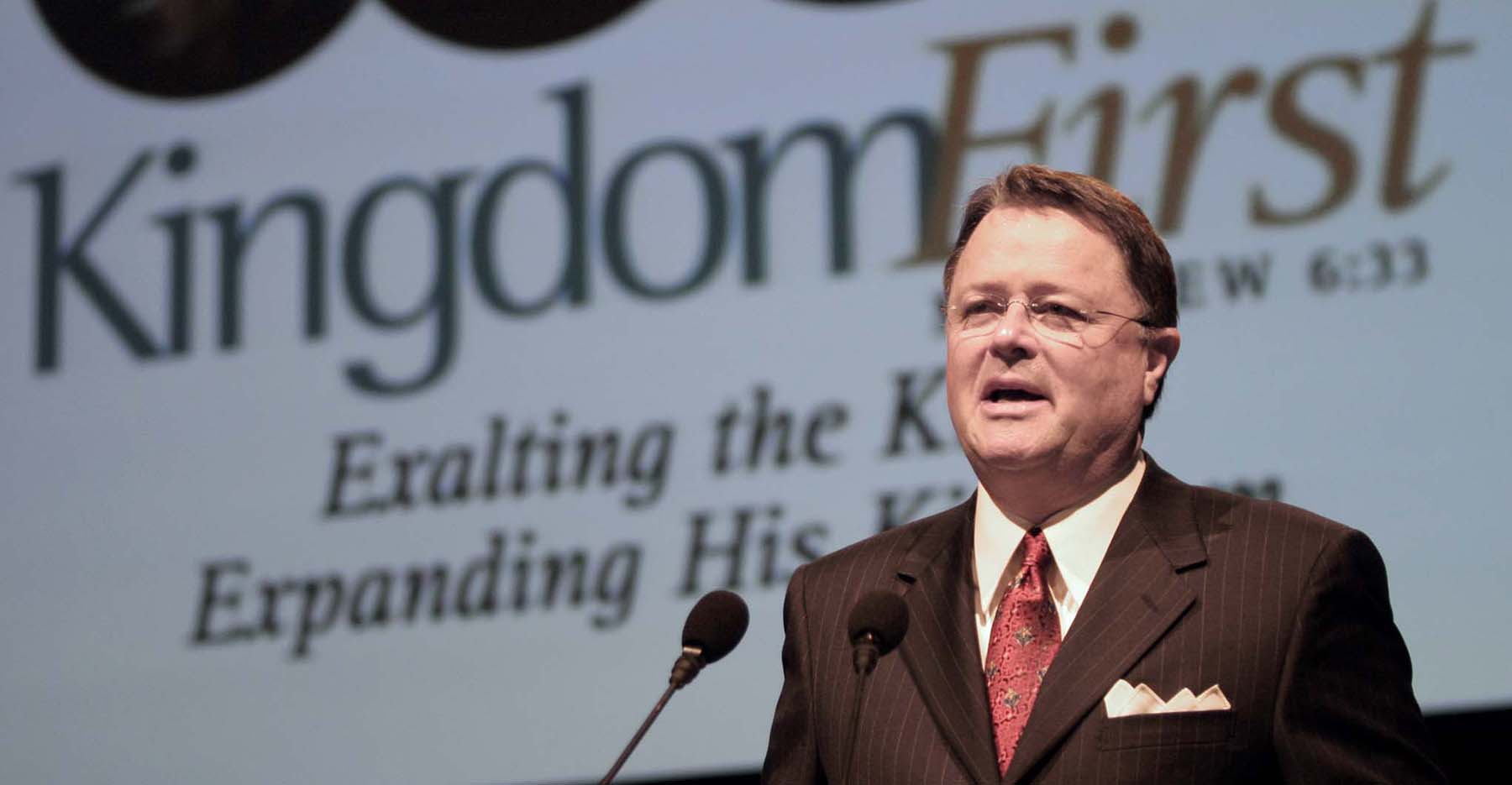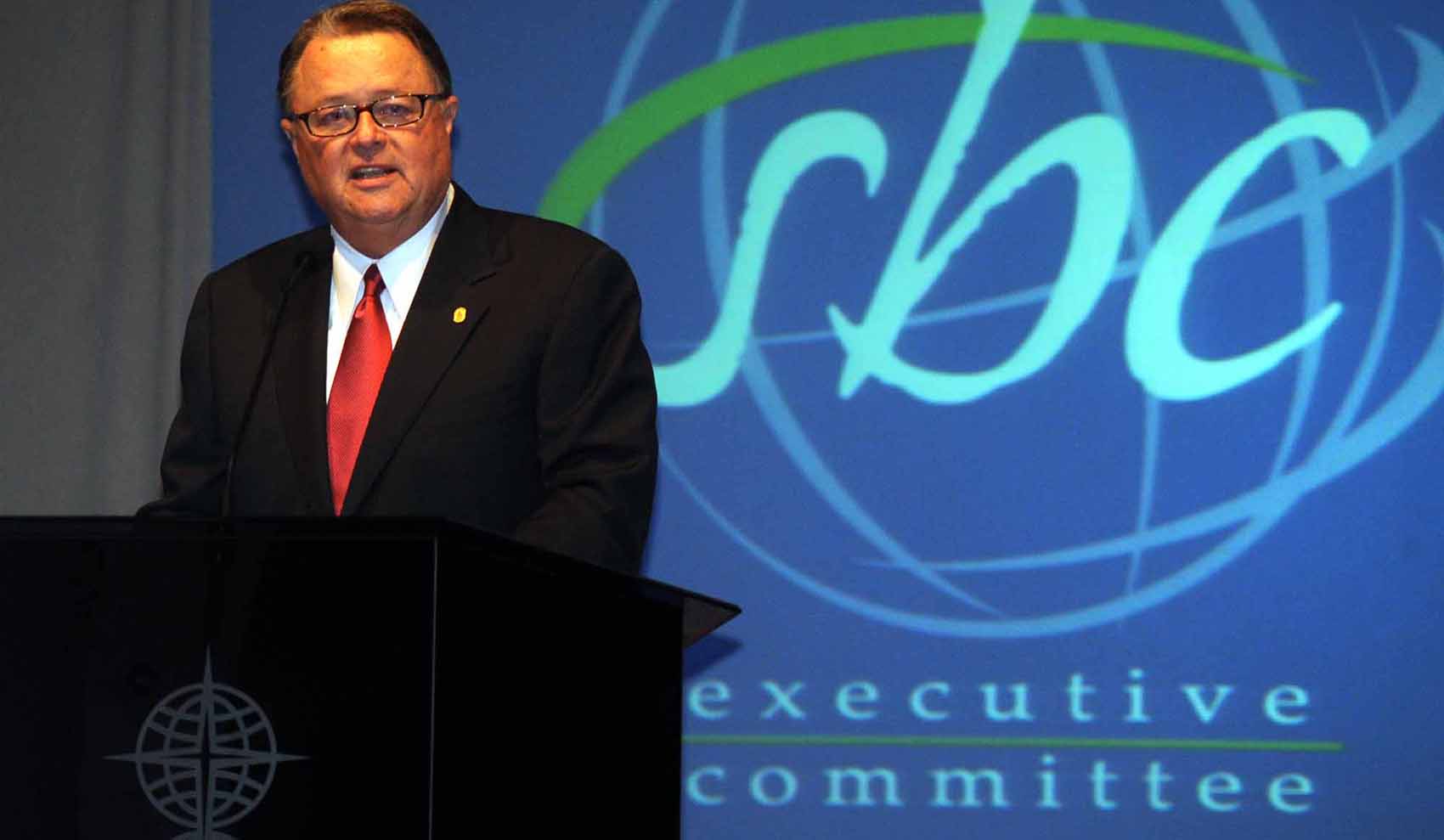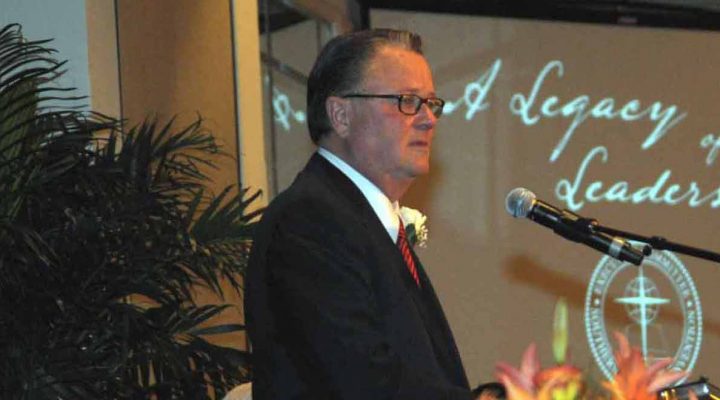As the Southern Baptist Convention Executive Committee struggles to find a leader and faces attempts by other agency heads to shutter the central organizing group of the denomination, a former president says he is willing to come back and help stabilize the Nashville-based entity.
Morris Chapman served as president of the Executive Committee from 1992 to 2010. Retired for more than 13 years but still living in suburban Nashville, he told Baptist News Global in an exclusive interview Feb. 6 he would be willing to step in as a stabilizing interim leader if asked.
“I’ve had a number of people call and ask if I would I come back for a period of time to be president of the Executive Committee if nominated and elected,” he said. “Back in the days of earlier interims, I thought that might have been a place I could have made a contribution. But they made other plans.”
“I’m not shopping for any position, … but after several calls and encouragement, … I would be available.”
Now, after two of Chapman’s successors have come and gone amid scandal, the Executive Committee has been without a permanent staff leader for 27 months since the abrupt resignation of Ronnie Floyd in October 2021 in protest of an independent investigation into mishandling sexual abuse knowledge. Two other finalists for the position have withdrawn, and one finalist did not get enough votes to be elected.
“I’m not shopping for any position,” the 83-year-old Chapman said. “But after several calls and encouragement, I said if it was a reality that could happen, I could tell you I would be available.”
Whether the Executive Committee officers or the presidential search committee are aware of Chapman’s interest is not known. He said he has not yet communicated with them.
But if they were to call, he would be willing, he said, because he loves the SBC and believes the work of the Executive Committee is essential to the health of the denomination.

Morris Chapman in 2009 (Baptist Press)
Life or death for Executive Committee
As first reported by BNG yesterday, discussions are in the air about potentially shuttering the Executive Committee and farming out its duties to three other larger SBC entities: the International Mission Board, North American Mission Board and Guidestone Financial Resources.
Chapman, for one, thinks that is an awful idea. And this isn’t the first time he’s heard it. He recalled a seminary president floating the idea to him around 2005.
“One of the prominent seminary presidents was in my office in Nashville, … and he said, ‘We really don’t need the Executive Committee for the functions it performs today. The whole system of ministries within the SBC would be much more successful if the Executive Committee was simply a body of people who accounted for the income coming through the offerings.’ I responded, ‘Oh, that can never be.’ I had come to the conviction that the Cooperative Program (unified budget) was perhaps the most effective Christian funding mechanism established anywhere in the country or the world.”
Among its assigned duties, the Executive Committee receives offerings from churches through state Baptist conventions and disburses those funds to all SBC agencies and institutions. The Executive Committee staff also plans and runs the annual meeting, operates Baptist Press and oversees relationships between the various entities according to policies adopted by trustees.
It is that oversight that some current agency heads want to get away from, according to both Chapman and other sources for the earlier BNG story.
Cooperative Program
Take away the Executive Committee and you will deal a death blow to the Cooperative Program, he warned. “Evidently, from what I see and hear now, there are a number of entity heads who do not cherish the concept of the Cooperative Program as I did when I was a pastor. … I knew we could get more. First Baptist Church of Wichita Falls, Texas, was giving about 12% and over a period of time we made it to 16% on an annual basis.”
“Evidently, from what I see and hear now, there are a number of entity heads who do not cherish the concept of the Cooperative Program as I did when I was a pastor.”
That spirit of greater financial cooperation to fund all the work of the SBC was a hallmark of the denomination for decades. However, it was questioned by others who, along with Chapman, rode the coattails of the “conservative resurgence” to turn the SBC in a rightward direction from 1979 forward.
Chapman, although a staunch conservative, also is a staunch denominational loyalist. He believes in historic cooperation, he said.
“I came to the conviction that if the Executive Committee does not exist in some form similar to what it is today, we will no longer be cooperative churches,” he said. “That’s a horrifying thing to see. God has blessed the giving of the Cooperative Program and the emphases of the Cooperative Program.”
Again, lack of interest in the Cooperative Program is not new, Chapman said. He recalled a pastor who was elected SBC president some years ago who came to his office at the Executive Committee and declared, “My men are just not going to keep giving money when they don’t know where it’s going.”
As a unified budget, the Cooperative Program offers a joint approach to fund a variety of large and small ministries without each entity having to make individual appeals to 40,000 churches. Critics sometimes don’t like this agency or that seminary and want to divert their gifts to just the entities they favor.
“I believe we’re very close to the whole matter of cooperative funding and the cooperative nature of the SBC collapsing in front of our eyes,” he warned.

Morris Chapman in 2009. (Baptist Press)
Outside interference
One of Chapman’s greatest concerns today is that presidents of some other SBC entities appear to want to tell the Executive Committee how to do its work.
“The first thing that needs to happen to stabilize the Executive Committee is for the other entities to let it go its way of trying to find a solution. It can’t come overnight. The matter of other entities wanting to be ‘helpful’ in this particular financial time of the Executive Committee is not the way to do it.”
“The first thing that needs to happen to stabilize the Executive Committee is for the other entities to let it go its way of trying to find a solution.”
He specifically cited Guidestone, NAMB and IMB, which he said want to “split the caretaking of the Executive Committee into three slices. And each one will have complete administrative responsibilities over those three.”
If those agencies are willing to put up money to take on duties of the Executive Committee, they ought to be willing to loan the Executive Committee funds or grant funds to stabilize the Nashville organization instead, he suggested.
Considered more cynically, critics of the Executive Committee have intentionally set it up to fail, Chapman said. He criticized again — as he did in 2010 — the action of the Great Commission Resurgence Task Force that took $2 million in annual funding away from the Executive Committee and gave it to the IMB.
“There was $2 million taken from us for no reason at all,” he said. “The very committee that did it then is enjoying now saying, ‘We’ve got to break this thing down because it’s not going to work.’”
Meanwhile, in the SBC’s larger mission boards and seminaries, “there’s so much loose change out there that some are able to spend that’s not in the Cooperative Program. Southern Baptists need to ask, ‘Where does that money originate? Where’s the source of that?’”
Chapman is emphatic about this point: “The Cooperative Program is under attack.”
Lawsuits and sexual abuse
Although beloved by many Southern Baptists, Chapman has drawn the ire of reformers who want the SBC to acknowledge and make amends for its past mishandling of sexual abuse cases in churches. It was during Chapman’s tenure that one of his vice presidents, Augie Boto, kept a secret list of known abusers in SBC churches while Executive Committee leaders said it was not possible to produce such a list.
Abuse survivor and reform advocate Christa Brown has called for Chapman to be stripped of his title as president emeritus of the Executive Committee.
“I thought I did the best God asked me to do while I was there.”
Regarding his 18-year tenure, Chapman said, “I thought I did the best God asked me to do while I was there.”
He acknowledges, however, there are things he would have done differently if he knew then what he knows now.
“The lawsuits are certainly a powerful matter,” he said. “A lot of struggle. It created some mistakes on our part that maybe we would not have made had there not been so much pressure. Some of that pressure was coming from other entities. They let newspapers in general talk about the Executive Committee as the hub of ministry to those who have been sexually abused.
“From the start, the Executive Committee did not have the funding to do what was pushed upon it,” he continued. “It should have been pulled together maybe at a slower pace, but we were doing everything we could. We didn’t have the budget to do this.”
The death of the SBC
The SBC faces serious headwinds today, Chapman acknowledged. And that’s not just because of the lawsuits and the finances and the sinking metrics in baptisms and attendance.
The denomination “has become very political,” he said. “Politics already was growing in my last years at the Executive Committee. It was becoming very noticeable. There always had been politics, but if we are approaching the day when we hardly have anyone but men who politically vie for position and want it, that’s another thing that will create a major collapse.”
“I grieve that it is a different landscape. To work there in the years I did was a joy. I loved what I was doing,” he said.
Chapman remains loyal to the denomination that birthed him and nurtured him, but he fears the SBC is losing its Baptist distinctives.
“I love the Lord, and I love the Lord because he revealed himself to me through a Southern Baptist church, Southern Baptist pastor and Southern Baptist parents. We have so many people across this country who are ready and willing to do great things for the Lord.”
But today, “we have pastors who are leading people in the ways of other denominations, the ways of other worship,” he lamented. “Why can’t we gravitate toward something we were at the beginning?”
Related articles:
How might the SBC reshape itself next? | Analysis by Mark Wingfield
Ronnie Floyd resigns SBC Executive Committee leadership with two weeks’ notice


